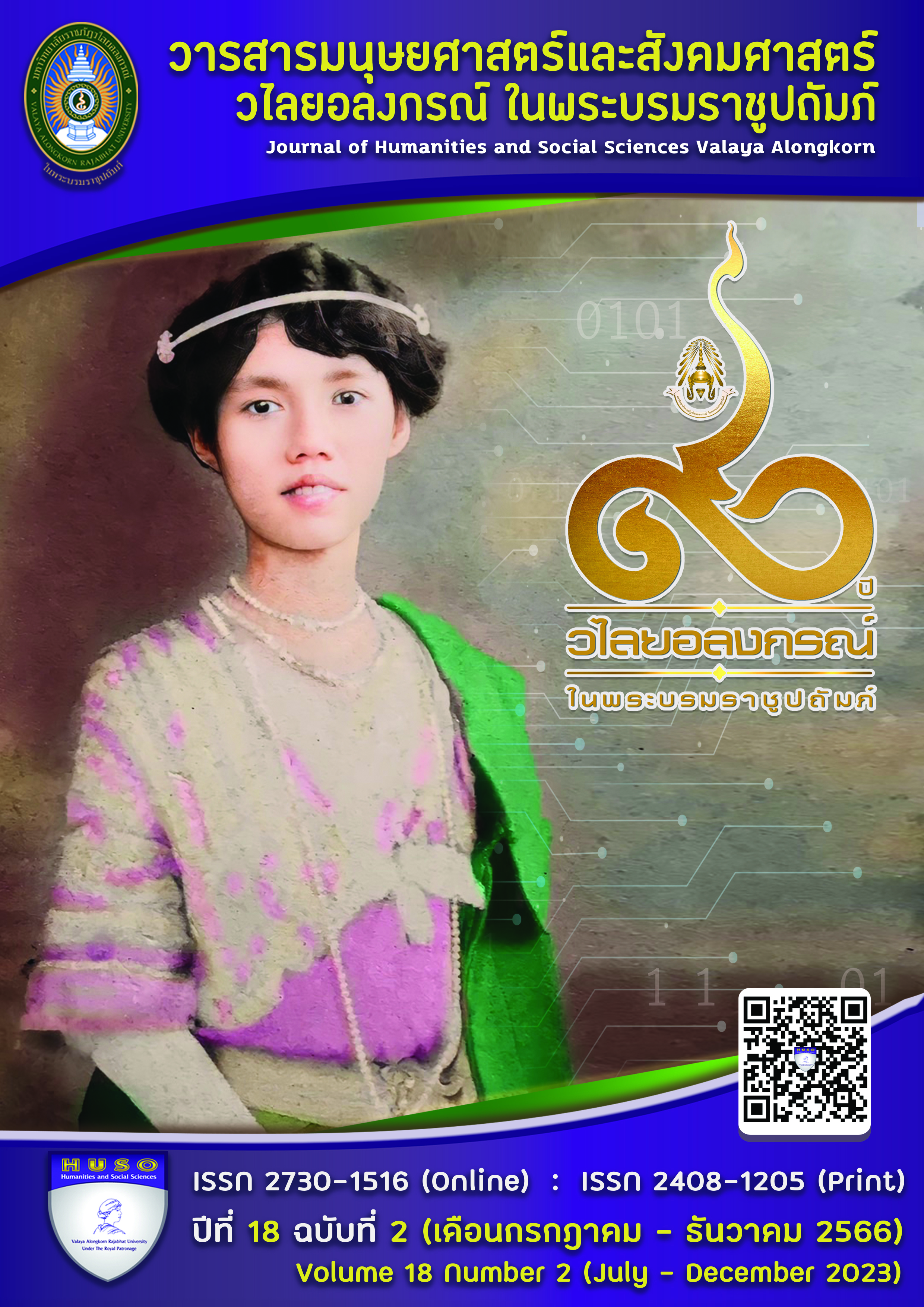THE BUILDING AND MAINTAINING THE POLITICAL SUPPORT BASE FOUNDATION IN ANG THONG PROVINCE
Main Article Content
Abstract
The purposes of this research are (1) to scrutinize the political context affecting
the formulation of political strategies of the Chart Thai Pattana Party in creating and maintaining
a political support base; (2) to discuss the Chart Thai Pattana Party’s best strategies for building and maintaining the political support base foundation in Ang Thong Province; (3) to investigate and find out the causes and grounds for the termination of its political support base in Ang Thong Province. A qualitative research method was used for document analysis and in-depth interviews with 17 people who were directly involved, serving as key informants. The data collected were analyzed and interpreted to draw conclusions using an inductive model approach.
The results of this research indicate that:
1) After the great tragedy of October 14, 1973, people became more aware of politics, leading to the 1974 constitution announcement, which defined that the candidates for
the House of Representatives needed to be under a political party. Later, the Chart Thai Party was established by the Soi-Rachakru group and businessmen with close ties with the Chunhawan family and Adireksan family under the pretext of the 1974 Political Party Act.
2) The Chart Thai Party created its political power base through connections with
a forest concession businessman such as Mr. Somchai Lerkwararak. After Mr. Somchai’s passing, the Chart Thai Party changed its political strategies to preserve its power base by supporting Mr. Somsak Prissananthakul, who succeeded the political party “Samnuekrakbankerd”.
3) The primary reason why the Chart Thai Pattana Party ended its political support base in Ang Thong Province was the election on March 24, 2019, and the result was not in their favor, resulting in the change of political parties by its politicians. In addition, the Prissananantakul group terminated the political support base of the Chart Thai Pattana Party for any candidates for membership in the House of Representatives.
Article Details

This work is licensed under a Creative Commons Attribution-NonCommercial-NoDerivatives 4.0 International License.
ลิขสิทธิ์บทความวิจัยที่ได้รับการตีพิมพ์เผยแพร่ในวารสารมนุษยศาสตร์และสังคมศาสตร์ วไลยอลงกรณ์ ในพระบรมราชูปถัมภ์ ถือเป็นกรรมสิทธิ์ของคณะมนุษยศาสตร์และสังคมศาสตร์ มหาวิทยาลัยราชภัฏวไลยอลงกรณ์ ในพระบรมราชูปถัมภ์ ห้ามนำข้อความทั้งหมดหรือบางส่วนไปพิมพ์ซ้ำ เว้นแต่จะได้รับอนุญาตจากมหาวิทยาลัยเป็นลายลักษณ์อักษร
ความรับผิดชอบ เนื้อหาต้นฉบับที่ปรากฏในวารสารมนุษยศาสตร์และสังคมศาสตร์ วไลยอลงกรณ์ ในพระบรมราชูปถัมภ์ เป็นความรับผิดชอบของผู้นิพนธ์บทความหรือผู้เขียนเอง ทั้งนี้ไม่รวมความผิดพลาดอันเกิดจากเทคนิคการพิมพ์
References
เจนจิรา แพนพันธุ์อ้วน. (2564). การปรับตัวของพรรคชาติไทยพัฒนาหลังการสูญเสีย นายบรรหาร ศิลปอาชา กรณีศึกษา: จังหวัดสุพรรณบุรี [วิทยานิพนธ์รัฐศาสตรมหาบัณฑิต ไม่ได้ตีพิมพ์] มหาวิทยาลัยบูรพา. ThaiLis.
ปรีชา คุวินทรพันธุ์. (2543). ความสัมพันธ์ทางเครือญาติ เพื่อนและผู้อุปถัมภ์กับผู้รับอุปถัมภ์ในสังคมที่ซับซ้อน
ในระบบอุปถัมภ์ พิมพ์ครั้งที่ 2). สำนักพิมพ์แห่งจุฬาลงกรณ์มหาวิทยาลัย.
พัฒนชัย สีนอเพีย. (2552). ฐานอำนาจทางการเมืองในจังหวัดอ่างทองของนายสมศักดิ์ ปริศนานันทกุล
[วิทยานิพนธ์รัฐศาสตร์มหาบัณฑิต ไม่ได้ตีพิมพ์]. มหาวิทยาลัยสุโขทัยธรรมาธิราช. ThaiLis. https://shorturl.asia/MamQ0
เยาวลักษณ์ ชาวบ้านโพธิ์. (2563). พรรคชาติไทยกับการสร้างอำนาจทางการเมือง. วารสารสันติศึกษา
ปริทรรศน์ มจร, 8(2), 417-430.
ลิขิต ธีรเวคิน. (2542). ระบบอุปถัมภ์และการเมืองไทย. มหาวิทยาลัยธรรมศาสตร์.
วรรณี บุญประเสริฐ. (2556) จุดก่อกำเนิด การดำรงคงอยู่ และการพัฒนาเป็นสถาบันของพรรคชาติไทย.
[วิทยานิพนธ์ปรัชญาดุษฎีบัณฑิต ไม่ได้ตีพิมพ์]. มหาวิทยาลัยเกริก.
สินธุชัย ศุกรเสพย์. (2539). บทบาทของเจ้าพ่อในการเมืองไทย พ.ศ. 2517-2535. [วิทยานิพนธ์ศิลปะศาสตร
มหาบัณฑิต ไม่ได้ตีพิมพ์]. จุฬาลงกรณ์มหาวิทยาลัย. ThaiLis. https://shorturl.asia/aVFAx.


